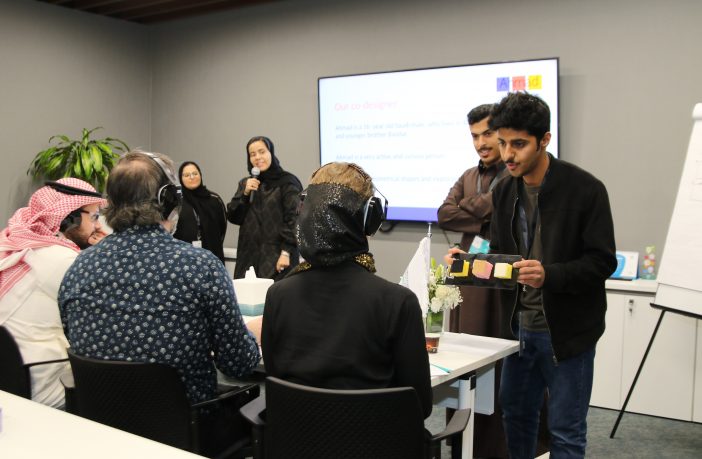BY LAURA MONSIVAIS
KSA’s globally recognized Human-Computer Interaction (HCI) Lab ideates and produces new assistive technologies, often co-designed with input from local people living with disabilities. It also identifies new talent and develops the capacity of young Saudi scientists and technologists, introducing them to “the transformative power of applied computing and HCI design,” and pointing them towards professional careers in emerging technologies. Founder and Director Dr. Areej Al-Wabil launched this monumental endeavor in 2010.
HCI all day, every day
In case you hadn’t realized it, you probably engage in HCI several times a day. Whether using Google Maps, converting text-to-speech or wearing an Apple watch, we have all come to depend on these brilliant, intuitive innovations that make us better at our work, pamper us with convenience, and amplify our audio-visual experience. At its most basic, HCI is the study of how computer technology influences human work and activities.
HCI can also be applied to Humanistic Co-Design to create assistive technology (AT) such as mobility devices, speech-generating devices, hearing aids and eye-gaze trackers that can function as a person’s legs, voice, ears or eyes to improve quality of life. Including the end-user as a collaborator in the design process can ensure more thoughtful, targeted products that solve or mitigate physical or cognitive challenges faced by community members of all ages.
When asked about the relationship between artificial intelligence (AI) and HCI, Al-Wabil explained that AI and HCI are two ends of the spectrum. “For the past 20 years, AI has been about getting machines to think and behave like humans. HCI has been about getting machines to adapt to humans. AI and HCI intersect in the field of emotion research, where machines are being taught to understand, classify, and process emotion in all its nuances. Now, we see the two fields merging into a single specialty called Human-Centered AI research.”
“AI has been about getting machines to think and behave like humans. HCI has been about getting machines to adapt to humans.”
The talent
The HCI Lab Team is comprised of three principal investigators including Al-Wabil, who is affiliated with the Massachusetts Institute of Technology’s (MIT) Ideation Lab; Shiroq Almegren, PhD, affiliated with MIT Engineering, and Sharifa Alghowinem, PhD, affiliated with the MIT Media Lab. Another affiliate is Dr. Kyle Keane of MIT’s CSAIL program and Director of the Humanistic Co-Design Initiative.
“The Lab is determined to create the next generation of interactive technologies.”

Together with its vibrant network of computer scientists, designers, engineers, social scientists, cognitive psychologists, physicians, and entrepreneurs, the Lab is determined to create the next generation of interactive technologies. They do community outreach, teach and research in such areas as ubiquitous computing, social computing, social robotics, eye tracking, and brain-computer interaction with a view to finding new solutions to old problems. Al-Wabil, who has a PhD in Computer Science, is always thinking ahead about community-driven problems and their socio-economic impact, and how the needs of people can best be reflected in our future technologies.
In keeping with Saudi Vision 2030’s goals of creating a knowledge-based economy and creating employment, HCI-Lab facilitates multi-disciplinary study, research and training for faculty and students that lead to enhanced career opportunities and contribute to the global body of knowledge in the form of joint intellectual property and publications.
The tools
The HCI Lab designs and develops prototypes that use virtual reality (VR) in surgical training, augmented reality (AR) in speech and physical therapy, and extended reality (XR) in occupational therapy. They also work with physiological sensors, interactive AI and machine learning. Brain-Machine Interface (BMI) restores or replaces useful function to people disabled by neuromuscular disorders. HCI-Lab is actively advancing this emerging field with award-winning technologies and interventions. The Lab is accessible to students and practitioners alike, providing equipment like 3D printers that make it possible to design and rapidly build prototypes for their research projects.
From R & D to Commercialization
HCI-Lab is laser-focused on developing assistive technology because KSA already leads the region in this relatively new field. Their in-house incubator, Co-Create, shepherds projects through iterations that typically last 3 to 6 years, after which the Lab helps inventors commercialize their finished product. Strategic partners at this stage include the Saudi Authority for Intellectual Property, the Saudi Health Council’s National Lab for Emerging Technology and King Fahad Medical City.
“In keeping with Saudi Vision 2030’s goals of creating a knowledge-based economy and creating employment, HCI-Lab facilitates multi-disciplinary study, research and training for faculty and students that lead to enhanced career opportunities.”
“Sawty,” which translates to “my voice,” is an alternative communication tool for Arabic-speaking children with language impairment, and an example of a rising MedTech AI startup that began its journey as a concept at the HCI-Lab. Now, this spin-off is enrolled in the Taqadam Accelerator via KAUST Innovation for 2020-2021.
Reflecting on the ascending visibility of HCI over the past 10 years, Al-Wabil mused, “I think like-minded people come together. In our team’s case, we share the same enthusiasm about technology for a specific scope of work, which is to piece together sensors and understand more about the human side of interaction; how people think, how they move…..and how to make them more comfortable.”
Human-Computer Interaction HCI Design Lab
HCI Lab at Alfaisal University
P.O. Box 50927, Riyadh 11533
Saudi Arabia
T: +966112157777
F: +966112157611
Email: team@hcilab.info
Website: hcilab.info
Twitter: @HCI_Lab




